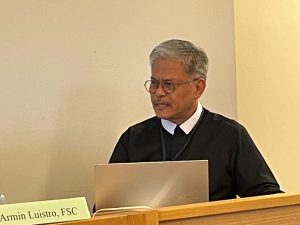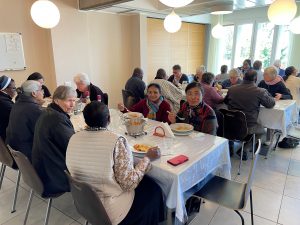 It looks like the biggest game changer in consecrated life and the missionary activity of the Church in our century is traceable to our declining numbers. In a 2021 study on the reasons for this decline in the 20th century, researchers from Leuven[1] studied available data between 1970 and 2020. The number of religious worldwide decreased by 33%, although the drop is much higher in Europe by 59% and in the US by as much as 71%. For the De La Salle Brothers, our numbers were still increasing while Vatican II was in session, reaching a peak of 16,824 Brothers in 1965. Fast forward 58 years to 2023, the congregation currently counts 2,972 Brothers registering an 82% decline since 1965. That is certainly a game-changer, if not an earth-shaking disruption!
It looks like the biggest game changer in consecrated life and the missionary activity of the Church in our century is traceable to our declining numbers. In a 2021 study on the reasons for this decline in the 20th century, researchers from Leuven[1] studied available data between 1970 and 2020. The number of religious worldwide decreased by 33%, although the drop is much higher in Europe by 59% and in the US by as much as 71%. For the De La Salle Brothers, our numbers were still increasing while Vatican II was in session, reaching a peak of 16,824 Brothers in 1965. Fast forward 58 years to 2023, the congregation currently counts 2,972 Brothers registering an 82% decline since 1965. That is certainly a game-changer, if not an earth-shaking disruption!
The researchers noted that while the decline worldwide was noticeable beginning in the 1950s up to the 1960s, it is possible that the decline started even as early as the 1930s and that it is highly unlikely that this could be traced to a single factor. Instead, they opine that it is best to consider that the “historical, societal, ecclesial, and theological factors all play a role and mutually influence one another”. Thus, the critical factors leading to the changing landscape we are experiencing today must be understood “in the context of developments in society and the Church today, but also account for the developments in Catholic theology after Vatican II up to today.”[2]
In the corporate world, the changing landscape has been captured since 1987 from the lens of what has been popularized as VUCA time or the age of volatility, uncertainty, complexity, and ambiguity. Societal leaders from business corporations, humanitarian organizations, or political parties have steeled themselves to be better prepared for the future through renewed calls for resilience, information gathering, restructuring, and continued experimentation or innovation to ensure institutional survival, sustainability, and continued growth. VUCA brought a sobering warning to all that it cannot be ‘business as usual’. Harvard Business Review[3] summarizes the key characteristics and possible approaches that could assist leaders in responding proactively and effectively. While planning tools using VUCA situations were used mainly for visioning workshops or scenario planning, the recent experience of the effects of COVID-19 should awaken leadership in religious congregations to look again at some of the key learnings we could pick from those planning strategies.
But our analysis of the facts and choice of appropriate responses and approaches cannot be devoid of the perspective of faith. It seems to me that the challenges to consecrated life are best understood from the lens of a renewed call for aggiornamento, which was the resounding appeal of Vatican II. We need to refresh our memory of that kairos moment more than six decades ago and then contextualize our response today by actively participating in the ongoing synodal journey of the Church. In our Institute, we discerned that we could do this best by inviting all the members of the Lasallian Family—not just the Brothers of the Christian Schools—to join our pilgrimage to the peripheries so that, together and by association, we can make the peripheries our home. We envision this conversion journey to transform us so we can be more attentive to God’s will in at least three ways by listening, together and by association, with the Holy Spirit speaking through:
(a) other voices in the Church, apart from the
hierarchy and congregational leaders,
(b) the cries from the peripheries and the
groans of all of creation for salvation, and
(c) the painful realities we face today in our
respective religious families.
As a first step, we communicated to our confreres that the center of the Institute is not only in Rome but is also found in every community burning with zeal for the mission. In our first year in office, we have decided as a General Council community to spend two weeks each in the five regions of the Institute. Visits to projects in the margins are prioritized. We continue to hold Lasallian Conversations with various sectors of the wider Lasallian Family, spending ample time listening to participants’ experiences and reflections instead of inputs from experts or leaders. We intend to convene seven global commissions composed of Lasallian Partners and Brothers tasked to assist the Institute in listening attentively to emerging critical issues and seeking creative ways to respond.
We have realized that the personal, institutional, and congregational conversion we pray for should bring us farther from our comfort zones and closer to God’s Reign.
From a Church of the Magisterium to a Church that listens.
From a teaching congregation to a learning community.
From a sage on the stage to a guide on the side.
From an expert with a big ego to a novice with a humble heart.
From an exclusive club of Brothers with a “big B” to becoming little sisters and brothers for “those far from salvation”.
We have launched the Institute’s Leavening Project as our overarching framework inviting all Lasallians—Partners and Brothers, institutions and communities, teachers and students, women and men, young and old—to begin the journey to the peripheries and away from our comfort zones, collaborating with other protagonists active in the peripheries, and being transformed in the process as we rediscover our sisters and brothers among God’s poor and in all of creation. From a position of strength, we are now forced to face our human mortality, institutional vulnerabilities, and real threats to our communities and ministries. Burdened with the task of maintaining existing Lasallian institutions, we also face many obstacles in opening new ministries, given the limitations on human and financial resources. Thus, we embraced the Gospel imagery of the power of yeast in transforming dough as our overall framework for the next seven years. These may be very small initiatives, but they should have a community component where Brothers from different cultures and ages can witness our fraternity. It should also allow lay volunteers to join a mixed Lasallian community or for lay members to form an all-lay Lasallian community.
We recognize that the call of the Leavening Project to seek “new pathways” is not necessarily novel, as we are merely building on those earlier efforts of the Institute since Vatican II to be faithful to our founding story. Among these milestones were efforts to:
Open spaces for dialogue. On the District and global level, many sessions were held to review community and institutional vision-mission statements as well as policies and programs with the participation of multiple stakeholders. Concerns about safeguarding and integrity arising from concrete cases were a wake-up call to institutionalize policies for protecting children and vulnerable adults and financial standards. Other discussions revolved around the need to be more inclusive and less selective in our schools while surfacing the very real issues of the viability of school operations given the increasing cost of education when the majority of teachers and staff are salaried personnel.
Create avenues for voices from the peripheries to be heard and amplified. Several of these sessions included the active participation of Lasallian women, students and youth, and the non-formal education sector. Invited to these sessions were representatives from marginalized groups such as farmers, fisherfolk, refugees, street children, indigenous communities, etc.
Experiment with more inclusive governance structures. Districts created Mission Councils composed of Lasallian Partners and independent experts from other fields. The District of France, for example, created the Tutel model, which is their school network recognized as a legal entity in the country but connected with the Institute officially under the rules of Canon Law. On the global level, we started inviting lay associates years back to our General Chapters with voice but without vote. We have also convened three international Lasallian assemblies of lay associates with voice and vote to discuss and decide on the global Lasallian Mission. In our current structure, we have a Mission Council where lay associates’ responsibilities are similar to those of the General Councilors. Recently, half of the FSCs in the International Economic Council were replaced by lay associates who are finance experts.
Collaborate with other religious congregations or non-government organizations. Recognizing that the Lasallian charism and educational mission are not meant to build up the Institute but are in service of God’s Reign, we have started to work with other congregations, dioceses, and NGOs to initiate new ministries or projects, including participation in the inter-congregational project, Solidarity for South Sudan. We have two joint communities with the Marist Brothers, one in the Amazon and the other in Lebanon. We have joint formation programs with several other Brothers’ congregations through Tutti Fratelli.
 The journey has just begun, although we are discovering many seeds have already been planted in the past decades without us being aware of them. Some are already starting to sprout and grow. One such important realization is that since the 1950s, when the number of Brothers reached its peak, the number of students entrusted to us in our schools has been steadily on the rise. Serving less than half a million students worldwide in the 1950s, enrollment rose to more than 700 thousand in the 1960s and kept increasing even while the number of Brothers started a steep decline. We continue to register a yearly increase in student population despite COVID-19 and the continued drop in Brothers worldwide. Evidently, this is made possible through the faith and zeal of more than a hundred thousand Lasallian associates worldwide. We only started tracking their impact on the Institute beginning in 1994. Before that time, like women and children in ancient Jewish times, they were not counted. The numbers do not tell the full story, but we now have a better sense of where the Holy Spirit is leading us if we are serious about participating in the grand plan of God’s Reign.
The journey has just begun, although we are discovering many seeds have already been planted in the past decades without us being aware of them. Some are already starting to sprout and grow. One such important realization is that since the 1950s, when the number of Brothers reached its peak, the number of students entrusted to us in our schools has been steadily on the rise. Serving less than half a million students worldwide in the 1950s, enrollment rose to more than 700 thousand in the 1960s and kept increasing even while the number of Brothers started a steep decline. We continue to register a yearly increase in student population despite COVID-19 and the continued drop in Brothers worldwide. Evidently, this is made possible through the faith and zeal of more than a hundred thousand Lasallian associates worldwide. We only started tracking their impact on the Institute beginning in 1994. Before that time, like women and children in ancient Jewish times, they were not counted. The numbers do not tell the full story, but we now have a better sense of where the Holy Spirit is leading us if we are serious about participating in the grand plan of God’s Reign.


